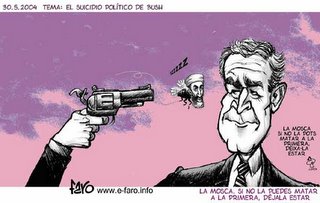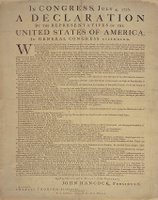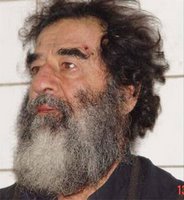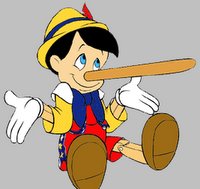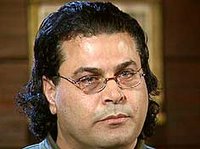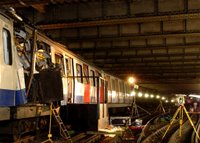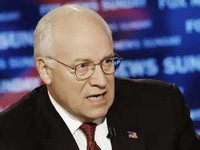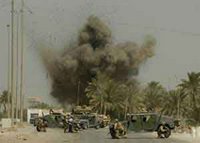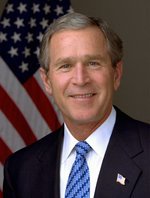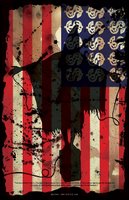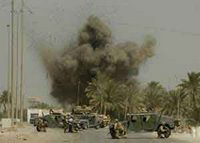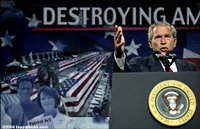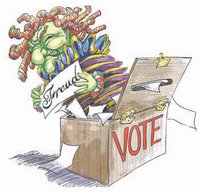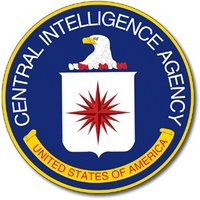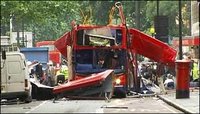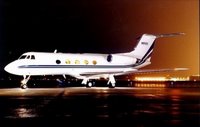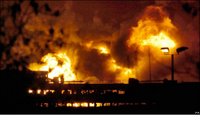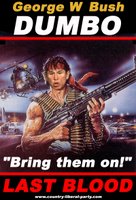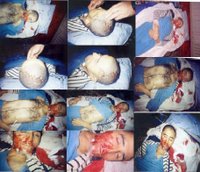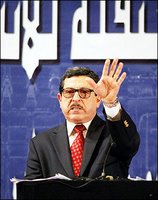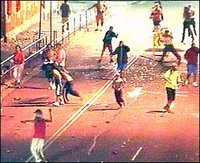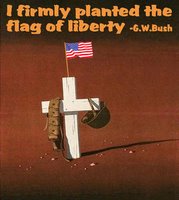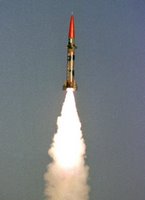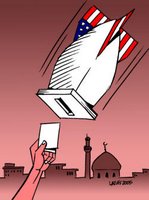War without end
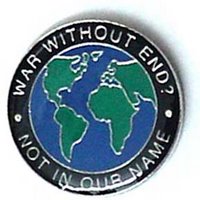 This was the year the "war on terror" - an obnoxious expression which we all parroted after 11 September 2001 - appeared to be almost as endless as George Bush once claimed it would be. And unsuccessful. For, after all the bombing of Afghanistan, the overthrow of the Taliban, the invasion of Iraq and its appallingly tragic aftermath, can anyone claim today that they feel safer than they did a year ago?
This was the year the "war on terror" - an obnoxious expression which we all parroted after 11 September 2001 - appeared to be almost as endless as George Bush once claimed it would be. And unsuccessful. For, after all the bombing of Afghanistan, the overthrow of the Taliban, the invasion of Iraq and its appallingly tragic aftermath, can anyone claim today that they feel safer than they did a year ago?We have gone on smashing away at the human rights we trumpeted at the Russians - and the Arabs - during the Cold War. We have perhaps fatally weakened all those provisions that were written into our treaties and conventions in the aftermath of the Second World War to make the world a safer place. And we claim we are winning.
Where, for example, is the terror? In the streets of Baghdad, to be sure. And perhaps again in our glorious West if we go on wih this folly. But terror is also in the prisons and torture chambers of the Middle East. It is in the very jails to which we have been merrily sending out trussed-up prisoners these past three years. For Jack Straw to claim that men are not being sent on their way to torture is surely one of the most extraordinary - perhaps absurd is closer to the mark - statements to have been made in the "war on terror". If they are not going to be tortured - like the luckless Canadian shipped off to Damascus from New York - then what is the purpose of sending them anywhere?
And how are we supposed to "win" this war by ignoring all the injustices we are inflicting on that part of the world from which the hijackers of September 11 originally came? How many times have Messrs Bush and Blair talked about "democracy"? How few times have they talked about "justice", the righting of historic wrongs, the ending of torture? Our principal victims of the "war on terror", of course, have been in Iraq (where we have done quite a bit of torturing ourselves).
But, strange to say, we are silent about the horrors the people of Iraq are now enduring. We do not even know - are not allowed to know - how many of them have died. We know that 1,100 Iraqis died by violence in Baghdad in July alone. That's terror.
But how many died in the other cities of Iraq, in Mosul and Kirkuk and Irbil, and in Amara and Fallujah and Ramadi and Najaf and Kerbala and Basra? Three thousand in July? Or four thousand? And if those projections are accurate, we are talking about 36,000 or 48,000 over the year - which makes that projected post-April 2003 figure of 100,000 dead, which Blair ridiculed, rather conservative, doesn't it?
It's not so long ago, I recall, that Bush explained to us that all the Arabs would one day wish to have the freedoms of Iraq. I cannot think of an Arab today who would wish to contemplate such ill fortune, not least because of the increasingly sectarian nature of the authorities, elected though they are.
The year did allow Ariel Sharon to achieve his aim of turning his colonial war into part of the "war on terror". It also allowed al-Qa'ida's violence to embrace more Arab countries. Jordan was added to Egypt. Woe betide those of us who are now locked into the huge military machine that embraces the Middle East. Why, Iraqis sometimes ask me, are American forces - aerial or land - in Uzbekistan? And Kazakhstan and Afghanistan, in Turkey and Jordan (and Iraq) and in Kuwait and Qatar and Bahrain and Oman and Yemen and Egypt and Algeria (there is a US special forces unit based near Tamanrasset, co-operating with the same Algerian army that was involved in the massacre of civilians the 1990s)?
In fact, just look at the map and you can see the Americans in Greenland and Iceland and Britain and Germany and ex-Yugoslavia and Greece - where we join up with Turkey. How did this iron curtain from the ice cap to the borders of Sudan emerge? What is its purpose? These are the key questions that should engage anyone trying to understand the "war on terror".
And what of the bombers? Where are they coming from, these armies of suiciders? Still we are obsessed with Osama bin Laden. Is he alive? Yes. But does he matter? Quite possibly not. For he has created al-Qa'ida. The monster has been born. To squander our millions searching for people like Bin Laden is about as useless as arresting nuclear scientists after the invention of the atom bomb. It is with us.
Alas, as long as we are not attending to the real problems of the Middle East, of its record of suffering and injustice, it - al-Qa'ida - will still be with us. My year began with a massive explosion in Beirut, just 400 metres from me, as a bomb killed the ex-prime minister Rafiq Hariri. It continued on 7 July when a bomb blew up two trains back from me on the Piccadilly line. Oh, the dangerous world we live in now. I suppose we all have to make our personal choices these days. Mine is that I am not going to allow 11 September 2001 to change my world. Bush may believe that 19 Arab murderers changed his world. But I'm not going to let them change mine.
Source Robert Fisk Independent




